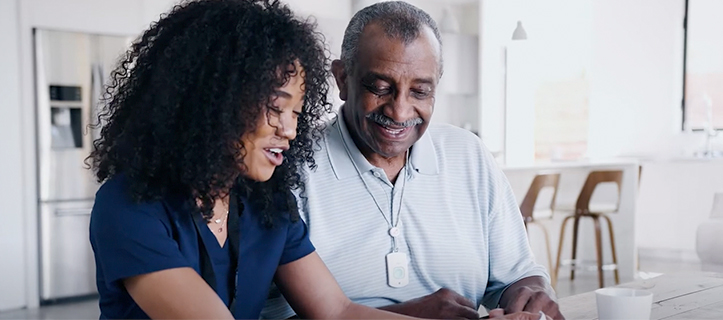Introducing: Penn Foster’s Veterinary Technician Program
This program is in Voluntary Terminal Accreditation with AVMA-CVTEA and there is a moratorium on admissions effective May 1, 2024. Programs in Voluntary Terminal Accreditation are still accredited and graduates of a program at Voluntary Terminal Accreditation are considered graduates of an AVMA CVTEA-accredited program.
While Ashworth College is no longer Accepting enrollments in our Veterinary Technician Associate Degree Program, we’re excited to introduce you to our partner school, Penn Foster.

If you're interested in becoming a credentialed veterinary technician, Penn Foster’s AVMA-CVTEA accredited online Veterinary Technician Degree can help you prepare to take the first steps. Throughout your self-paced course work and externships, you can gain the knowledge and hands-on skills that can help you prepare to sit for the VTNE and start a new career.
LEARN MOREBecome a Vet Tech Online
Penn Foster’s online Veterinary Technician Associate Degree is designed to help you build the skills and hands-on knowledge that can help you take the first steps toward becoming a vet tech. You’ll cover courses in animal anatomy and physiology, pharmacology, and more. You’ll also participate in two clinical externships to apply what you learned online to real-world situations.
Then, you’ll sit for the VTNE to become a credentialed vet tech. The national pass rate for the VTNE is 70%. Penn Foster’s current pass rate is 72.17%.
Why Penn Foster?
Penn Foster has been on a mission to help people like you launch, accelerate, and thrive in their careers for more than 125 years. We provide students with a quality education that fits your busy lifestyle and budget, offering over 100 self-paced, career-relevant programs across our College, Career School, and High School. The program you choose is structured to fit your learning needs so you can achieve your goals, and is designed to work with your schedule, anytime, anywhere you want to study.
Learn at the speed that works best for you.
Develop the skills employers are looking for.
Choose the tuition payment plan that works for you.
What You’ll Learn with Penn Foster’s Vet Tech Degree
- How to prepare to sit for the VTNE exam by studying animal healthcare, animal anatomy and physiology, veterinary practice management, veterinary pharmacology, and more.
- How to recognize an animals’ integumentary, urinary, and endocrine systems using engaging visual learning aids and interactive assessments.
- How to care for large and small animals, small and large animal medicine, animal nutrition, laboratory animal medicine, and more.
- How to be a part of a working veterinary team and apply knowledge and skills in a mixed-animal practice.
Penn Foster’s Online Veterinary Technician Curriculum
Through your four-semester degree program, you’ll build the necessary skills and knowledge to sit for the VTNE and take the next steps toward becoming a credentialed vet tech. Your classes include:
- Animal Anatomy and Physiology
- Pharmacology for Veterinary Technicians
- Surgical Nursing for Veterinary Technicians
- Small and Large Animal Medicine
- Laboratory Animal Medicine and Nursing
Ashworth Vet Tech Program Accreditation
The Associate of Applied Science Degree in Veterinary Technician is accredited by the American Veterinary Medical Association (AVMA) Committee on Veterinary Technician Education and Activities (CVTEA). Ashworth College is also accredited by the Distance Education Accrediting Commission.

Learn More About the Penn Foster Experience
Just like Ashworth College, at Penn Foster we believe the benefits of online learning can be life-changing—and should be accessible to all. That’s why our affordable programs are designed with you in mind. You're able to learn and develop new skills for exciting careers your way – on your schedule, at your speed.
Next Steps
Once you graduate, you’ll be eligible to take national credentialing exams like the Veterinary Technician National Exam (VTNE) which is a requirement for employment in the field in many states. Once you graduate, you’ll be eligible to take national credentialing exams like the Veterinary Technician National Exam (VTNE) which is a requirement for employment in the field in many states. View VTNE test scores for Ashworth’s Vet Tech Students.
Veterinary Technician FAQs
Whether you’re new to online education or have taken an online course before, you may still have some questions about how it works. Here’s what you need to know.
While a vet tech degree may not be required to work in the field in all states, it can be an important credential to help you stand out when applying for vet tech jobs. Additionally, many states DO require you to be certified or registered as a veterinary technician, and earning an AVMA-accredited degree is necessary to pursue those industry-recognized credentials. By earning a veterinary technician degree and completing your clinical hours, you’re also building foundational skills that will be necessary to successfully complete your day-to-day duties as a vet tech.
As soon as you enroll, you gain access to the Ashworth College Central Network. It's an online toolkit that offers step-by-step guidance for building your resume, drafting cover letters, writing thank you notes, and more. Your lessons may refer you to the Ashworth College Central Network as you prepare to graduate and take new steps in your career. Even though we’re no longer accepting enrollments into this program, after you earn your degree, you'll still retain your account so you can sharpen your resume and interview skills anytime you need to.
Our online Veterinary Technician Associate Degree is entirely self-paced, meaning you can prepare for a career on your terms. While the average completion time for students is 6 months per semester, you’re given up to 4 years to complete the entire degree program.
After graduation, you may choose to sit for the VTNE. The VTNE is a nationally recognized credential that can be vital to starting a career as a veterinary technician. Once you’ve passed the VTNE, you can go on to become a certified or registered veterinary technician in your state. If you'd like to continue your education and increase your earning potential in the field, you can also enroll in the Veterinary Technology Bachelor’s Degree offered through our sister school, Penn Foster.
Veterinary Technician Clinical Experience
Veterinary technicians have a wide range of hands-on responsibilities including providing emergency care or nursing aid, administering x-rays, preparing animals for surgery, and more. As part of our program, you have the opportunity to develop these skills in a real-world clinical environment. We will provide students with advice and strategies to aid in the pursuit of finding a clinical site. And, unlike other vet tech programs, clinical experience hours are included in each semester.
Students and prospective students are advised to review the program’s health and safety policies located in the student catalog to help inform them of occupational risks to zoonotic diseases and rabies prevalence in the region they will be performing clinical skills.
Some students choose to use a fast track lab to complete some of their clinical skills on species which may be more difficult to access near the student’s home. Fast track labs, offer accelerated clinical experiences focusing on large and sometimes laboratory animal skills. However, it's key to recognize that these optional labs are hosted by third parties, so come with additional costs to students. The average expense ranges from $400 to $450, covering the lab itself, but students must also consider travel and lodging expenses. Students are advised to budget for all associated costs and make informed decisions to maximize the benefits of fast track labs.
State and local laws may restrict clinical experiences to those at least 18 years old.
State requirements
A career in this field may require you to meet certain licensing, training, and other requirements that can vary by vocation and state. You should check with your state, local government, and/or licensing board to find out which requirements may be applicable in your state. Click here for contact information on state licensing/regulatory boards and certain professional licensing information.


